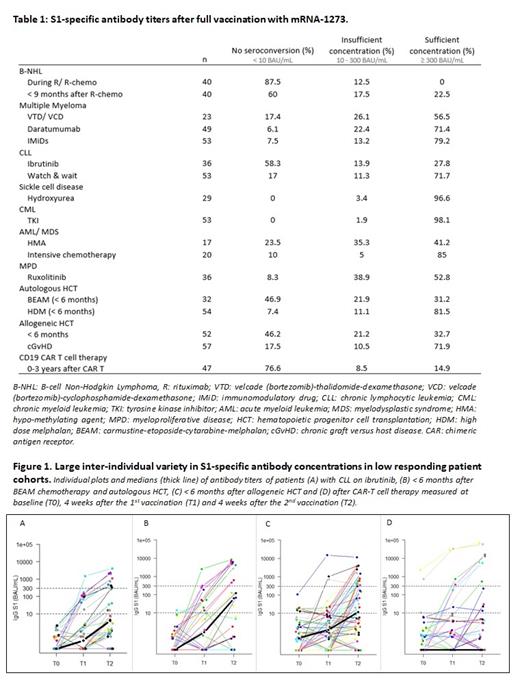Abstract
Background: Patients with hematologic conditions have a high mortality rate when infected with SARS-CoV-2 (Williamson, Nature 2020). Protection of this group from severe COVID-19 is therefore important. However, according to available vaccination guidelines, one should consider to postpone vaccination of patients on or early after chemotherapy, hematopoietic progenitor cell transplantation (HCT) or with graft versus host disease, because of anticipated poor efficacy. Based on previous (non-COVID-19) vaccination studies among hematology patients, we hypothesized that a significant group of patients may acquire sufficient protection following COVID-19 vaccination, despite disease and therapy related immunodeficiencies.
Methods: We conducted a prospective cohort study with 17 cohorts of hematology patients of particular risk for severe COVID-19 who are considered to have no or limited benefit from vaccination. We evaluated humoral immune responses following 2 doses (28 days apart) of the mRNA-1273 vaccine (Moderna/Spikevax) in 722 patients, at baseline and 28 days after each vaccination as SARS-COV-2 S1- (spike)-specific serum IgG antibody concentrations by bead-based multiplex immune assay. The threshold for adequate antibody response is set at ≥300 binding antibody units (BAU)/ml according to the international WHO standard, and is associated with virus plaque reducing neutralization test titers of ≥40 PRNT 50. This study is registered as EudraCT 2021-001072-41, NL76768.029.21.
Results: Patient cohorts and corresponding vaccine responses are depicted in Table 1. Vaccine efficacy, as measured by antibody concentration, 4 weeks after the 2 nd mRNA-1273 vaccination was available for 691 out of 722 participants. The majority of patients (389/691; 56%) obtained an S1 antibody titer that is considered adequate (≥300 BAU/ml). Twenty-nine percent of patients (198/691) did not seroconvert (S1 antibody titer <10 BAU/ml), while the remaining 15% (104/691) did seroconvert but not to sufficient levels (10-300 BAU/ml). Adequate responses were observed in the majority of patients with sickle cell disease using hydroxyurea, chronic myeloid leukemia (CML) receiving tyrosine kinase inhibitor therapy, acute myeloid leukemia (AML) on or early after high dose chemotherapy, patients with myeloproliferative disorders on ruxolitinib, patients with multiple myeloma (MM), including those on daratumumab and those early after high-dose melphalan and autologous HCT, patients with untreated chronic lymphocytic leukemia (CLL), and patients with chronic GvHD. Insufficient or absent antibody responses were observed in the majority of AML patients receiving hypomethylating agents, CLL patients on ibrutinib, patients with B-cell non-Hodgkin's Lymphoma (NHL) during or shortly after rituximab-chemotherapy or following BEAM chemotherapy and autologous HCT, allogeneic HCT recipients <6 months after transplantation, and CAR-T cell therapy recipients. However, even in these low-responder groups considerable numbers of patients did mount sufficient antibody titers. In others, titers increased after each of both vaccinations, suggesting that booster vaccination may enhance antibody titers to sufficient levels (Figure 1).
Conclusion: Vaccination with mRNA-1273 had significant efficacy in severely immunocompromised hematology patients. Adequate humoral immune responses after two dose vaccination were reached in the majority of patients receiving therapy for sickle cell disease, MPD, MM, CML and AML, in patients early after HCT and in patients with GvHD. We are currently evaluating clinical and immunologic parameters that correlate with sufficient antibody responses, pseudovirus neutralization and SARS-COV-2-specific B and T cell numbers, phenotype and function. Per study design, all participants with absent or insufficient antibody responses (<300 BAU/ml) will receive a booster vaccination 5 months after initial vaccination, and antibody responses to booster vaccinations will be presented as well. Unlike currently available guidelines, COVID-19 vaccination should not be postponed. Moreover, as antibody titers increased after each of both vaccinations, booster vaccination of patients with absent or insufficient antibody responses seems warranted.
Mutsaers: AstraZeneca: Research Funding; BMS: Consultancy. Van Meerten: Janssen: Consultancy; Kite, a Gilead Company: Honoraria. Kater: BMS, Roche/Genentech: Other: Ad Board, , Research Funding; Janssen, AstraZeneca: Other: Ad Board, steering committee, Research Funding; Abbvie: Honoraria, Other: Ad Board, Research Funding; Genmab, LAVA: Other: Ad Board, Steering Committee. Zweegman: Oncopeptides: Membership on an entity's Board of Directors or advisory committees; Sanofi: Membership on an entity's Board of Directors or advisory committees; BMS: Membership on an entity's Board of Directors or advisory committees; Takeda: Membership on an entity's Board of Directors or advisory committees, Research Funding; Janssen: Membership on an entity's Board of Directors or advisory committees, Research Funding. Nijhof: Janssen: Membership on an entity's Board of Directors or advisory committees; Celgene/Bristol Myers Squibb: Membership on an entity's Board of Directors or advisory committees.


